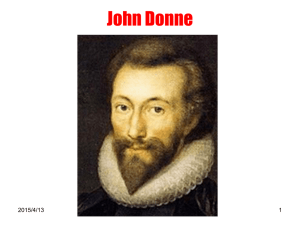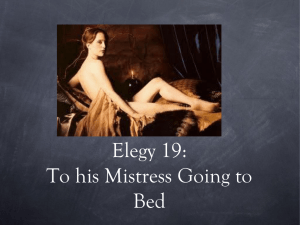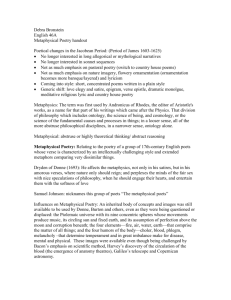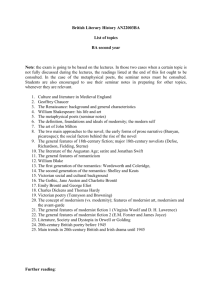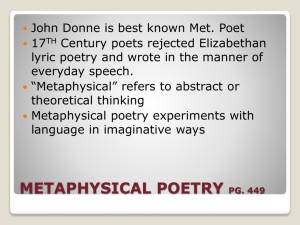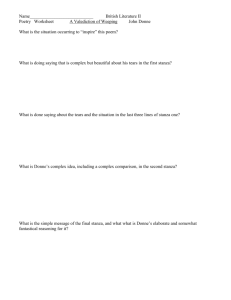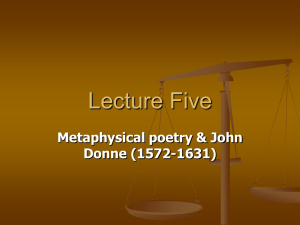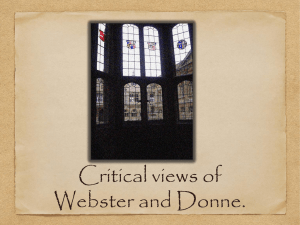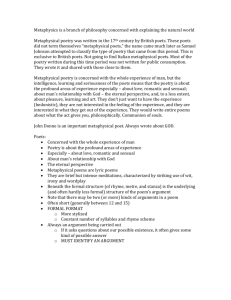Donne powerpoint
advertisement
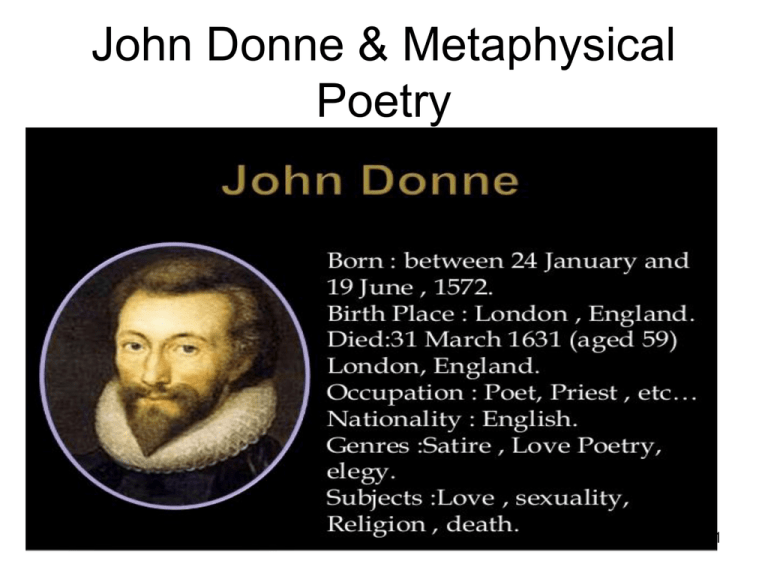
John Donne & Metaphysical Poetry 1 Donne’s Early Life • John Donne was born in Bread Street, London in 1572 to a prosperous Roman Catholic family - a precarious thing at a time when anti-Catholic sentiment was rife in England, and the practice of Catholicism was illegal. • Donne’s mother was the great-niece of the Roman Catholic martyr, Thomas More. This tradition of martyrdom would continue among Donne's closer relatives- many were executed or exiled for religious reasons. Religion played a passionate and tumultuous role throughout Donne’s life. • His father, also named John Donne, was a well-to-do iron dealer and a respected Roman Catholic who avoided unwelcome government attention out of fear of persecution. Donne's father died suddenly in 1576, and his mother married a wealthy widower a few months later. Donne’s Education & Some Personal Tragedy • In 1583, the 11-year-old Donne began studies at Hart Hall, now Hertford College, Oxford (there was no chapel, and it was popular among Catholics because they couldn’t check attendance at services) . After three years of studies there, Donne was admitted to the University of Cambridge where he studied for another three years. However, Donne didn’t obtain a degree due to his Catholicism, since he refused to take the Oath of Supremacy required to graduate. • He was admitted to study law as a member of Thavies Inn (1591) and Lincoln's Inn (1592), and it seemed natural that Donne should embark upon a legal or diplomatic career. • Donne's brother Henry was also a university student prior to his arrest in 1593 for harboring a Catholic priest, William Harrington, whom he betrayed under torture. Around the time of his brothers death, Donne to began questioning his Catholic faith. Travel & True Love As a young man hungry for adventures, he went with Essex on the expedition to Cadiz in 1596 and later became secretary to Lord Keeper Egerton. In 1601 he eloped with the niece of Lord Keeper and was imprisoned by the girl's father. For several years after his release, he lived in poverty. But during this time he wrote some of his most beautiful poems, many of which were believed to have been written to his wife. These were known as his youthful love lyrics. 4 So Much Death and Poverty… • Married in 1601, had 12 children (incl. 2 stillborns) • Three more children died before age 10 • His wife died in 1617; he never remarried – Rare for this time • In a state of despair, Donne noted that the death of a child would mean one less mouth to feed, but he could not afford the burial expenses. He mourned her deeply and wrote of his love and loss : ( Life In 1615 he gave up Catholic faith and entered the Anglican Church and soon became Dean of Saint Paul's Church. As the most famous preacher during the time, he wrote many religious sermons and poems. And these were known as his sacred verses. John Donne’s House Just So You Know… • “Donne wrote some of the most passionate love poems and most moving religious verse in the English language” (Damrosch and Dettmar 1669). • He is hailed as the “Monarch of Wit” (Dickson xi). • He wrote FIVE different types of poems: – Satires – Elegies – Verse Letters – Songs & Sonnets – Holy Sonnets or “Divine Poems” Satires • Dealt with common Elizabethan topics, such as corruption in the legal system. • They also dealt with the problem of true religion, a matter of great importance to Donne. He argued that it was better to examine carefully one's religious convictions than blindly to follow any established tradition, for none would be saved at the Final Judgment. Three stages of Donne’s Poetry Not necessarily chronological, but an easy way to categorize Donne’s works. 1. 2. 3. The young “Jack Donne:” reflected by a misogynistic, lusty, and cynical persona in his early poetry (“The Flea,” “The Bait,” and “Song—Go and Catch a Falling Star”); The courting / married lover: reflected by a Neoplatonic ideal of transcendent love- but a love also founded in the physical (“A Valediction: Forbidding Mourning” and “The Ecstasy”) Dr. Donne, the dean of St. Paul’s Cathedral: religious poetry (Holy Sonnets) and prose (“Meditation 17”) that sometimes praises, sometimes struggles with God’s transcendent perfection. Stage 1: Early Poetry (Elegies) • Donne's earliest poems: Knowledge of English society coupled with sharp criticism of its problems • His Erotic Poetry- Donne’s early career was also notable for his erotic poetry(sexy stuff, wooo), especially his elegies • He employed unconventional metaphors to portray sex Stage 2 Poetry- (Neo) Platonic Love • Physical love (animal lust) is base, common, low-born; • Spiritual love is worthy, unique, divine • Love, through procreation, is the closest humans come to immortality • Comprehension of love brings comprehension of beauty as infinite • Stages of Platonic love: 1) Initiated by Sense 2) Founded in Reason 3) Attains Spiritual Quality • A Neoplatonic Syllogism: 1. God is everlasting, perfect divine love; 2. True, spiritual love is everlasting and perfect; 3. Therefore, two lovers united by spiritual love are close to divinity. • These works include: “A Valediction: Forbidding Mourning” and “The Ecstasy” Stage 3- Religious Poetry ❖a more somberand pious tone in his later poems: Because of His numerous illnesses, financial strain, and the deaths of his friends ❖Donne focused his literary career on religious literature.He quickly became noted for his sermons and religious poems. Religious Poetry Cont (Stage 3) • His early belief in the value of skepticism now gave way to a firm faith in the traditional teachings of the Bible. • The lines of these sermons come to influence future works of English literature. – E.g. Ernest Hemingway‘s For Whom the Bell Tolls, which took its title from a passage in Meditation XVII – Thomas Merton’s No Man is an Island,which took its title from the same source. Meditation XVII • No man is an island, entire of itself; every man is a piece of the continent, a part of the main. If a clod be washed away by the sea, Europe is the less, as well as if a promontory were, as well as if a manor of thy friend’s or of thine own were.Any man’s death diminishes me because I am involved in mankind, and therefore never send to know for whom the bell tolls; it tolls for thee. Later Poetry Continued- A Challenge to Death Towards the end of his life Donne wrote works that challenged death, and the fear that it inspired in many men, on the grounds of his belief that those who die are sent to Heaven to live eternally. * 16 What Does Metaphysical Mean? • • • The word 'meta' means 'after,' so the literal translation of 'metaphysical' is 'after the physical.' Basically, metaphysics deals with questions that can't be explained by science. It questions the nature of reality in a philosophical way. Here are some common metaphysical questions: – Does God exist? – Is there a difference between the way things appear to us and the way they really are? Essentially, what is the difference between reality and perception? – Is everything that happens already predetermined? If so, then is free choice non-existent? – Is consciousness limited to the brain? Metaphysics can cover a broad range of topics from religious to consciousness; however, all the questions about metaphysics ponder the nature of reality. And of course, there is no one correct answer to any of these questions. Metaphysics is about exploration and philosophy, not about science and math. So… what’s metaphysical poetry? • The poems classified in this group share common characteristics: they are all highly intellectualized, use rather strange imagery, use frequent paradox, contain extremely complicated thought, wit, and argument. • Metaphysical poetry is a classification of poetry, not a genre. • The main poets of this group didn't read each other's work and didn't know that they were even part of a classification. • Literary critic and poet Samuel Johnson first coined the term 'metaphysical poetry' in his book Lives of the Most Eminent English Poets (1179-1781). In the book, Johnson wrote about a group of 17th-century British poets that included John Donne, George Herbert, Richard Crashaw, Andrew Marvell and Henry Vaughan. He noted how the poets shared many common characteristics, especially ones of wit and elaborate style. The main features of metaphysical poetry can be summarized as the following: • Wit or conceit is commonly used, but the wit or conceit is so odd that the reader usually loses sight of the thing to be illustrated. (This will be covered in another slide) • The theme is peculiar. The theme is not decorated by conventional comparisons. Instead, it is illumined or emphasized by fantastic metaphors and extravagant hyperboles. • Sensuality is blended with philosophy, passion with intellect, and contraries are ever moving one into the other. • Complex rhythms are used. 19 Characteristics of Metaphysical Poetry With a rebellious spirit, the metaphysical poets tried to break away from the conventional fashion of the Elizabethan love poetry. The diction is simple and echoes the words and cadences of common speech. The imagery is drawn from the actual life. The form is frequently that of an argument with the poet’s beloved, with God, or with himself. You MUST understand these things regarding Donne’s style when we’re done today, so pay close attention and ask me to clarify if you have questions regarding: • Metaphysical Conceit • Complex • Paradox • Posed as an argument Metaphysical Conceit In Donne’s day, conceit simply meant: idea. • Metaphysical Conceit: combination of heterogeneous ideas yoked together by violence that is sustained throughout the poem. • an extended metaphor that combines two vastly different ideas into a single idea, often using imagery. • One of the most famous of Donne's conceits is found in "A Valediction: Forbidding Mourning" where he compares two lovers who are separated to the two legs of a compass. These Poems are…Complex! • Meant to make you think. • “It makes demands upon the reader and challenges them to make it out. It does not attempt to attract the lazy and its lovers have always a certain sense of being a privileged class, able to enjoy what is beyond the reach of vulgar wits” (The Metaphysical Poets 17). Paradox • What is paradox? – An apparently untrue or self-contradictory statement or circumstance that proves true upon reflection or when examined in another light. Argumentative Form • Donne's poetry involves a certain kind of argument, sometimes in rigid syllogistic form. He seems to be speaking to an imagined hearer, raising the topic and trying to persuade, convince or upbraid him. With the brief, simple language, the argument is continuous throughout the poem. • The poems forms force the reader to trace the argument throughout the entire poem. • They always have a surface level meaning, and then an implication (explore some sort of conflict) John Donne is famed for 3 things 1. A great visitor of ladies 2. A great frequenter of plays 3. A great writer of conceited verses At his time, John Donne was famed as a preacher. Today, he is famed as a lyric poet. John Donne's conceit can be seen from his "Go catching the falling star" in which he listed many impossible things---the most impossible thing is a woman's faith and heart. 26
